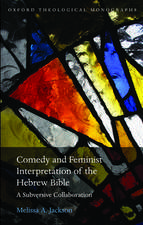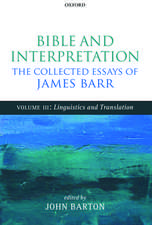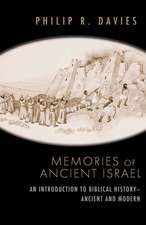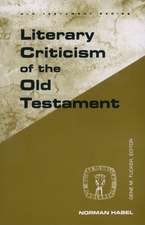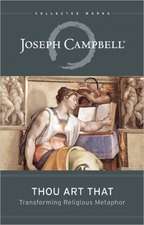The So-Called Deuteronomistic History: A Sociological, Historical and Literary Introduction
Autor Thomas Romeren Limba Engleză Paperback – 16 mai 2007
Preț: 230.69 lei
Preț vechi: 265.01 lei
-13% Nou
44.15€ • 45.74$ • 36.84£
Carte tipărită la comandă
Livrare economică 22 martie-05 aprilie
Specificații
ISBN-10: 0567032124
Pagini: 224
Dimensiuni: 156 x 234 x 16 mm
Greutate: 0.34 kg
Editura: Bloomsbury Publishing
Colecția T&T Clark
Locul publicării:London, United Kingdom
Caracteristici
Cuprins
Introduction; Part I. The content of the So-called Deuteronomistic History; (Deuteronomy - 2 Kings); 1. Deuteronomy; 2. Joshua; 3. Judges; 4. Samuel-Kings; Part II. What Does 'Deuteronomistic History' Mean? - A Survey of Past Research; 1. The Prehistory of the Deuteronomistic History Hypothesis; 2. The Elaboration of the Deuteronomistic History Hypothesis by M. Noth; 3. Major Modifications and Criticisms of the Deuteronomistic History Hypothesis; 4. The Present State of Discussion: A Time for Compromise?; Part III. The Deuteronomistic History From the Assyrian to the Persian Period; 1. Who Were the 'Deuteronomists'?; 2. The Foundation Myth of the Deuteronomistic School in 2 Kings 22-23: Book-finding and Cultic Reform; 3. The Three Different Viewpoints about Centralization in Deuteronomy 12 as an Example of the Threefold Edition of the. Deuteronomistic History; Part IV. Deuteronomistic Editing in the Assyrian Period and Royal Propaganda; 1. The Beginning of Deuteronomistic Literary Production in the Seventh Century; 2. The first edition of Deuteronomy in the Assyrian Period; 3. Political and Military Propaganda in the Book of Joshua; 4. Judges, Samuel and Kings; 5. Summary: The Origins of the Deuteronomistic Library in the Neo-Assyrian Period; Part V. The Constitution of the Deuteronomistic History in the Neo-Babylonian Period; 1. Setting the so-called 'Exilic Period'; 2. The Structure and Ideology of the Deuteronomistic History's Exilic Edition; 3. The Exilic Edition of the Deuteronomistic History; 4. Summary: The Exilic Edition of the Deuteronomistic History; Part VI. Editing the Deuteronomistic History During the Persian Period; 1. Social and Political Context in Judah During the Persian Period; 2. The Main Themes of the Persian Edition of the Deuteronomistic History; 3. The Death of the Deuteronomistic History and the Birth of the Torah.
Recenzii
"...a lucid and reader-friendly overview of biblical scholarship and a fine contribution to it; as such, it will be of considerable interest to both lay and professional audiences." Religious Studies Review, September 2009
"This is a fresh approach to a problem hotly debated...an impressive new synthesis; it also contains an abundance of fresh ideas for the exegesis of numerous chapters and verses and deserves the attention of everyone doing research on Deuteronomy, Kings, or anything in between...whether one believes in the Deuteronomistic History or not, this is the best book one can read about it." - Ernst Axel Knauf, University of Bern, Bern, Switzerland, Review of Biblical Literature
"Recommended as the most sophisticated literary theory on the Deuteronomist(s) currently available." - International Review of Biblical Studies, 2007.
"Well-conceived and scoped and clearly presented ... Römer's vast erudition and his long engagement with the material enables him to select and present with clarity." - Journal of Hebrew Scriptures
"Our Lausanne colleague has proved his expertise in matters Deuteronomistic in many essays and several edited volumes. This larger synthesis of the development of 'Deuteronomistic' thought from the Assyrian through the neo-Babylonian to the Persian period is less radical than some of the contemporary approaches he also surveys. But it is all the more welcome, since I know of no comparable volume in English." - Graeme Auld
"This is a tour de force by a leading scholar of international renown who is thoroughly conversant with both European and American biblical scholarship. The book is erudite and eminently readable. Romer's analysis of the Deuteronomistic History is well informed by its ancient Near Eastern background and literary parallels. Whether one is ultimately persuaded by his overall reconstruction or not, this volume has plenty of provocative new ideas and proposals." - Steven L. McKenzie is Professor of Hebrew Bible/Old Testament at Rhodes College, Memphis, USA
"Thomas Roemer is one of the best-known and well-respected scholars working on Deuteronomy and the Deuteronomistic History. In this book, readers will find not only an informative discussion about recent European and North American scholarship on the Deuteronomistic History, but also a creative proposal for a three-stage development of this literary work extending from Neo-Assyrian times to the Persian period." - Professor Gary N. Knoppers, Head, Classics and Ancient Mediterranean Studies, Penn State University, USA
'Romers erudite treatment of this subject is a must read for any and all who are engaged in study of DH.'
"For some time now there has been a need for an up-to-date, comprehensive treatment of the Deuteronomistic History...[t]his introduction fulfills all of those expectations very well....It remains a very thoughtful and well-informed study that may serve as a good starting point for further discussion ...I warmly recommend it to students and scholars as an introduction to this field of study."- John Van Seters, RBL, 09/2006
"The book as a whole is a thoughtful and thorough study which, in the words of Graeme Auld (in a blurb on the back cover) 'is all the more welcome, since I know of no comparable volume in English.'" - Ralph Doermann, Trinity Seminary Review, Summer/Fall 2008
Notă biografică
Thomas Romer is Professor of Old Testament in the Faculty of Theology at the University of Lausanne, Switzerland.
Descriere
In contrast to the Torah/Pentateuch, the Deuteronomistic History is not recognised by Jewish or Christian tradition as a separate collection. An investigation of the Deuteronomistic History, this work provides students and scholars of the Old Testament with a guide to this important subject.



